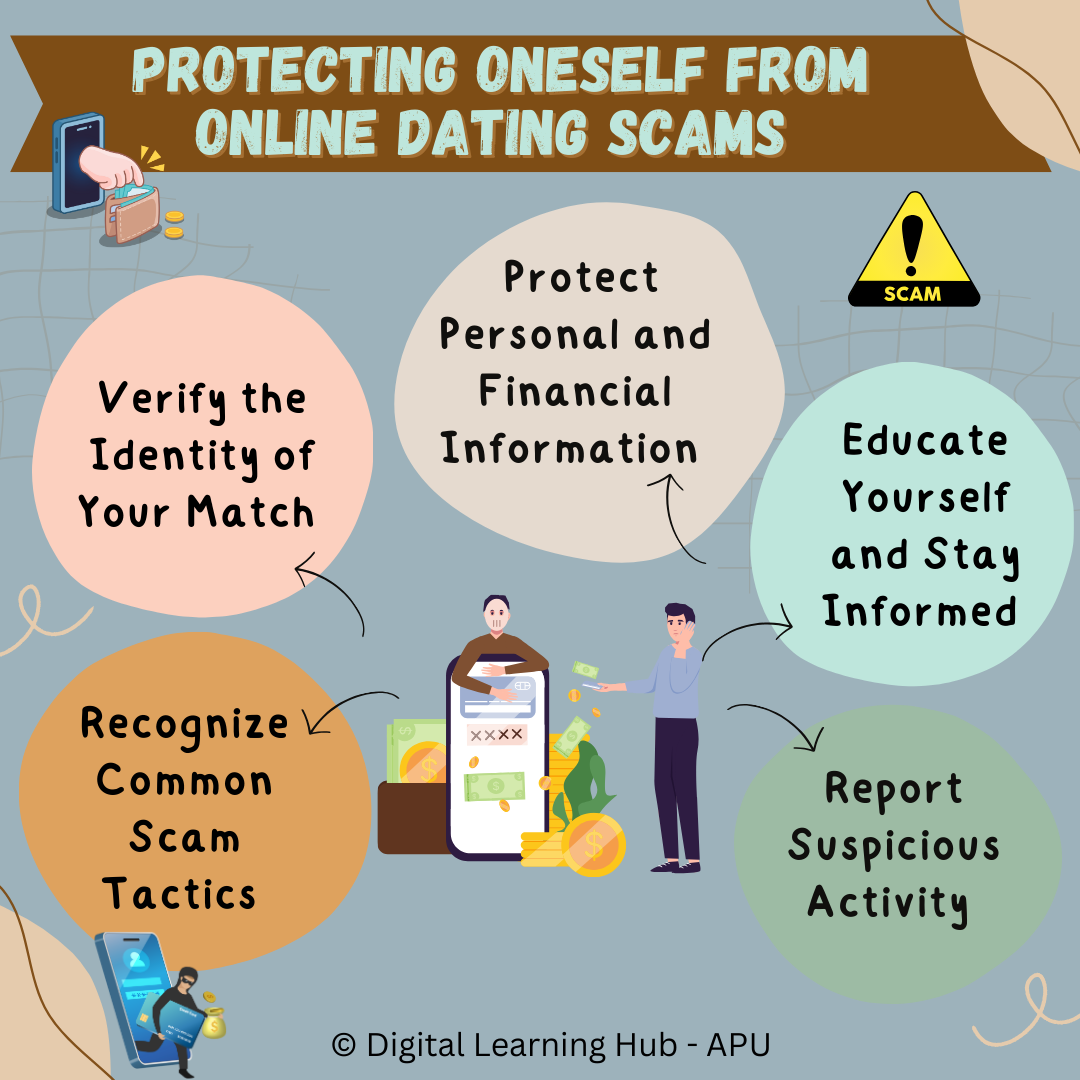Protecting Oneself from Online Dating Scams
Protecting Oneself from Online Dating Scams

Romance Scams: Scammers build emotional connections to manipulate victims into providing financial support or personal information. They often create fake profiles, profess love quickly, and present compelling, but false, personal stories.
Catfishing: Scammers use stolen or fake photos and profiles to deceive individuals into developing relationships. Their goal is often to extract money or personal details under false pretenses.
Investment Scams: Some scammers pose as wealthy individuals seeking investment opportunities. They may lure victims with promises of high returns on investments, which ultimately turn out to be fraudulent.
Fake Love: A scammer might create a profile with attractive photos and express deep affection early in the relationship, eventually claiming a crisis that requires financial assistance.
Impersonation: A scammer might use a fake identity and fabricated background to gain trust and eventually request money for supposed emergencies or travel expenses.
Conduct Reverse Image Searches: Use tools like Google Images or TinEye to check if the profile photos are taken from other sources or associated with fake accounts.
Request Video Chats: Genuine individuals are usually willing to engage in video calls, which can help confirm their identity. Scammers often avoid video chats or have excuses for not participating.
Check for Inconsistencies: Look for discrepancies in the information provided in the profile, messages, or during conversations. Scammers often have inconsistencies in their stories or backgrounds.
Image Searches: Running a reverse image search on a profile picture might reveal that the photo is widely used on different websites or associated with a known scammer.
Video Call Refusal: If a match consistently avoids video calls and offers excuses, this may be a red flag indicating potential deception.
Avoid Sharing Sensitive Data: Do not provide personal information such as Social Security numbers, bank details, or passwords. Be cautious about sharing too much personal information that could be used maliciously.
Use Secure Payment Methods: If a financial transaction is necessary, use secure and traceable payment methods. Avoid sending money through untraceable channels like wire transfers or gift cards.
Monitor Financial Accounts: Regularly check your bank and credit card statements for unauthorized transactions and report any suspicious activity immediately.
Sensitive Data: Scammers might request personal information under the guise of needing it for verification or travel arrangements. Do not provide such details without verifying the legitimacy of the request.
Untraceable Payments: If asked to send money via wire transfer or gift cards, this could be a scam. Legitimate requests for financial help usually come through more secure and traceable means.
Stay Updated on Scam Trends: Be aware of common and emerging scam tactics. Organizations such as the Federal Trade Commission (FTC) and consumer protection agencies provide updates and warnings about prevalent scams.
Seek Advice: Consult online dating safety guides and resources to understand best practices for protecting yourself. Join forums or groups where individuals share their experiences and advice.
Consumer Protection Alerts: Following updates from consumer protection agencies can provide early warnings about new scam techniques or fraudulent schemes.
Safety Resources: Online dating sites often have safety tips and resources available for users to learn about protecting themselves from scams.
Report to Dating Platforms: If you encounter suspicious behavior or believe you are being scammed, report the user to the dating platform. Most platforms have mechanisms for reporting and investigating fraudulent activity.
Alert Authorities: For financial scams or if you suspect criminal activity, report it to local law enforcement or national fraud agencies. Providing detailed information can help authorities take action and potentially prevent further scams.
Platform Reporting: If a user consistently exhibits red flags, report them to the dating site’s support team, which can investigate and potentially ban fraudulent accounts.
Law Enforcement: Reporting financial scams to authorities can help recover funds and prevent other individuals from falling victim to the same scam.
